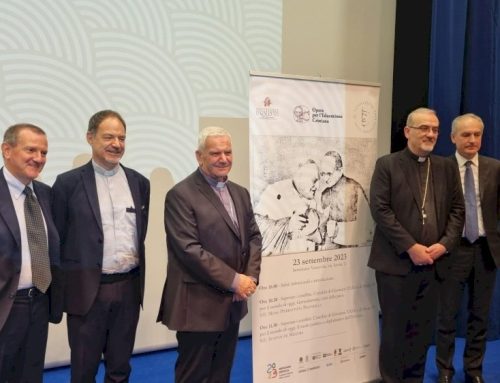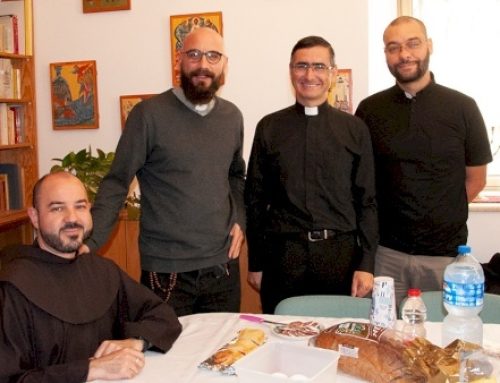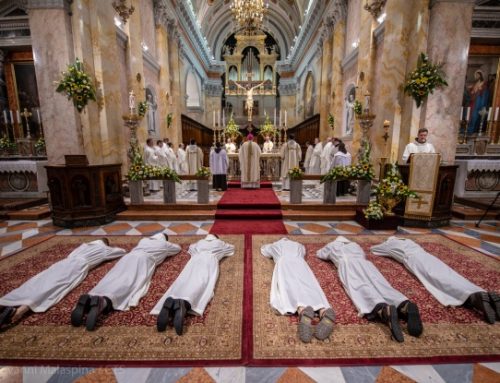WASHINGTON, DC, October 25, 2002 (OCNS) — Stories from the Holy Land are replete with violence- Israeli bombings of refugee camps, Palestinian suicide bombs of busses, Israeli assassinations of emerging Arab leaders, Palestinian attacks on settlers, ceaseless Israeli confiscation of Palestinian land, and exasperating leaders on both sides of the Green Line.
WASHINGTON, DC, October 25, 2002 (OCNS) — Stories from the Holy Land are replete with violence- Israeli bombings of refugee camps, Palestinian suicide bombs of busses, Israeli assassinations of emerging Arab leaders, Palestinian attacks on settlers, ceaseless Israeli confiscation of Palestinian land, and exasperating leaders on both sides of the Green Line.
Rarely does the Holy Land inspire stories of wonder and light these days. Yet, just as 2,000 years ago, there are beacons in the storm. There are Israeli Refusniks, the soldiers who go to jail rather than attack Palestinian civilians. There are the Arab Catholic Patriarchs and clergy, who face down gun barrels to march for peace and to serve their parishioners. Then there are the ordinary women who suffer daily humiliation, intimidation and anguish, yet overcome their despair to bring hope to us all. Three of these women spoke at the fourth international conference of the Holy Land Christian Ecumenical Foundation at National Presbyterian Church in Washington D.C. October 18 and 19.
“How Do Palestinians Survive with Christian Ethics?”
Dr. Evica Hazboun Ninos is one such victor. She is a psychiatrist, trained at University of Southern California, who treats children in the West Bank. The Jerusalem resident directs the Guidance and Training Center in Bethlehem. Unlike some of her colleagues, Dr. Hazboun believes the psyche goes hand-in-hand with religion.
“How do Palestinians survive with Christian ethics?” she asks. “We have to find victory in the loss, pride in the pain,” she answers. Often mistaken for a Pollyanna, she reminds people that great things followed the crucifixion of Jesus. She refers to his words, “My God, my God, why have you forsaken me?” On the cross, Christ alluded to Psalm 22 , which ends with the assurance that “They will proclaim His righteousness to a people yet unborn- for He has done it.”
Though only about ten miles by air, the trip between Dr Hasboun’s Jerusalem home and her Bethlehem clinic can take hours because of Israeli roadblocks. “It’s not easy to pass through a route every day where machine guns are aimed at your head,” Dr. Hazboun said. “But we do it.”
Despite the situation, she said, “we have al-karame, (dignity).” “No Palestinian at this point is ashamed to say he’s Palestinian.” Yet among the doctor’s Israeli friends, a few have expressed shame at be Israeli right now. As Palestinian conditions steadily worsen, the children she treats show increasing signs of trauma According to Dr. Hazboun. Forty five percent of the population in Gaza suffers from acute malnutrition. Fifty four percent of the children from a random sampling have Post-Traumatic Stress Disorder. Thirty six percent of them are bed-wetting, which is a serious symptom, and thirty percent of them display serious mental aggression, resulting in their inability to go to school or function in their families.
But, says the slim mother of grown children, “I’m proud of the children’s responses to very little intervention.” She noted the resilience of one girl who came to her mute after witnessing a bullet hit the wall near her head despite promises from her mother that they were in the safest room in their house. The child spoke again after she learned to accept that her parents were imperfect.
“The kids’ drawings” she says, “in 1987-91, were all red and black, of tanks and barbed wire.” Then from 1991-2000, during the period of the Palestinian authority’s rule in the territories, the drawings returned to normal daily life, depicting olive trees and weddings. Between 2000 and 2002, which increasingly resembles the national catastrophe of 1948, “the pictures are of dead people.”
One of the most alarming things for Dr. Hazboun is the children’s response to her inquiries about their dreams and wishes. Most can’t sleep to dream,” she said. Either they hear actual gunfire and bombs or they hear remembered noises of war.
One child said she was afraid to dream because it won’t come true. Kids can’t express wishes because they see no future and have no hope, Dr. Hazboun explained. “For a child not to express wishes is worse than cancer,” she said.
Contributing to Palestinian pain is the knowledge that people outside the region have little opportunity to learn the truth because the United Nations is denied permission to investigate incidents, the international media is denied access to controversial areas, and the call for international observers has been blocked by Israel.
Palestinians “have many reasons to use drugs and commit suicide bombings,” she said. “The reason not to is a conviction that ‘I can make a difference’.”
Absent the chance to create societal peace, Dr. Hazboun encourages work toward inner peace. “I haven’t yet learned to turn the other cheek,” she says, but I am working on it.”
“How to Bring Up My Children Without Hate in Their Hearts?”
Another light in the dark daily life of Palestinians is Claudette Habasch, Secretary General of Caritas Jerusalem, the local Catholic Charities.
“I am someone who believes in the power of peace,” Ms. Habasch says. Her roles as mother and grandmother, professional and Palestinian Christian each would challenge the strongest of us.
“How to bring up my children without hate in their hearts and with room for reconciliation?” is her critical question.
“Our task as parents and educators is becoming more difficult by the day,” she says. Children in her granddaughter’s class heard their priest explain that Jesus expects them to forgive their enemies, even those who have shelled their school several times, have put their cities under curfew, and continually have violated human rights. The children felt “these values (to forgive, love, and reconcile) were in direct conflict with their national values and aspirations.”
“I am more convinced than ever that the younger generation should not be left alone, but rather accompanied through this time of turmoil,” Ms. Habasch said. “Palestinians do have a vision, based on their rights as a nation and a people who are indigenous to Palestine and the Holy Land.”
“What had been a peaceful resistance, armed with rocks and U.N. Resolutions, was met with unprecedented brutal measures by the Israelis in an effort to put a quick end to it,” she explained.
“I propose to reframe the debate. Instead of Israeli against Palestinian, it is about those who choose violence as opposed to those who choose discourse, dialogue, and peace.” Her professional role enables her uniquely to see the need for and to directly encourage this paradigm.
A breakdown between the peace camps in Israel and Palestine leave a vacuum that is quickly filled by extremists of both sides, according to Ms. Habasch. Her organization, Caritas Internationalis, has joined an advocacy campaign with Churches for Middle East Peace and the World Council of Churches. Their joint slogan is: For Peace in Palestine, End the
Occupation.
Their overall objective is to restore people’s dignity. Their strategy is to focus first on the policies of the Israeli occupation that limit humanitarian aid access. The closures around towns and cities are essentially economic and social blockades. “We realize, after years and years of relief and development work,” Ms. Habasch explains, “we have a moral obligation to understand and challenge the structures of injustice. Otherwise, we potentially do harm.”
The peaceful warrior calls people in the church to practice “applied social justice.” She challenges the assumption that “the things that make for peace are decided by politicians inside the Washington Beltway.” Instead, she feels that citizens and people of good will, if mobilized and willing to speak out, will make the difference. “I believe the church can be a powerful force in this regard,” she said. “It is one of the few networks with the ability to go someplace new.”
She outlines key requirements of worldwide Christians who seek peace. We must exercise: the willingness to speak truth to power; the ability to name the sin without condemning the sinner; selflessness to set aside personal agendas to find a singular focus; cooperation among Palestinian, Israeli and international organizations working for peace; and sacrifice.
This is our crossroads-” Ms. Habasch said about Christians in the Holy Land- we carry “a past that has not been effective with a future that is threatened by inaction and lack of unity.” To all people of faith, says challenges, “It is up to us. Will we perish or survive?”
What Does It Mean to Carry a Cross?
Mother Agapia left her politically active Washington, D.C. family and went to the Holy Land six years ago to develop her inner life as a monastic within the walls of her convent. But, God had other plans. She went with no intention of working with the Palestinian people, but soon was posted as administrator of the Russian Orthodox school in Bethany. The Biblical town of Lazarus’ resurrection is directly East of Jerusalem in Area B, where Palestinians have civil control while Israelis have military control. All control was supposed to be in Palestinian hands by May, 2,000, she said.
Indigenous Palestinians and Israeli settlers lived in relative acceptance of each other until September 2000 when Ariel Sharon marched on the Temple Mount, sacred to Moslems and Jews, with 1,000 Israeli troops. The gesture sparked a counter protest, during which numerous Palestinians were killed, thus launching the Al Aqsa Intifada.
“I learned from the Palestinians what it means to carry a cross,” she said. During the 2001-2002 school year, the military repeatedly imposed curfew on the town. “Rather than being awakened by church bells or calls to prayer, we hear the armed personnel carriers and Israeli jeeps driving through the town calling “curfew” from their loud speakers,” she said. Roadblocks often prevent teachers or students from reaching school. Closures of towns and cities have ruined the economy and prevent many families from paying tuition. Workers and building materials cannot travel between towns to complete construction projects. Mother Agapia cited three non-violent marches being dispersed by tear gas and by Israeli tanks driving through the crowds. “There are now settlers placing bombs in front of school yards,” she said. “It is edging toward anarchy,” she said, noting how remarkably sound the Palestinian society feels despite these appalling conditions.
The road from Bethany into Jerusalem, Jesus’ entry route, is now blocked by a mound of dirt and cement to prevent its use by Palestinians, she said. Mother Agapia urges Christians everywhere to help in several ways. 1) Do not despair. 2) Speak when you can. 3) Give as you can. 4) Visit when you can. 5) Do not be afraid to speak because, according to Russian Orthodox tradition, “by silence, God is betrayed.” She also asks people to contact and to encourage Holy Land Christians, who are so isolated now. “The greatest thing is prayer,” she said. She closed with her own prayer that reconciles the inner and the outer life: “Lord grant patience to the oppressed and the fear of God to the oppressors.”
Editor’s Note: Kathleen Murphy is a freelance writer who attended the Fourth annual conference of the Holy Land Christian Ecumenical Foundation held in Washington, DC, on October 18 and 19, 2002. Orthodox News thanks
Ms. Murphy for contributing this story.
The views expressed are those of the authors, and do not necessarily represent the views of Orthodox Christian News Service, Inc.
Copyright (c) 1999, 2000 Orthodox Christian News Service, Inc. All rights reserved. Story content is Copyright the various content owners.



